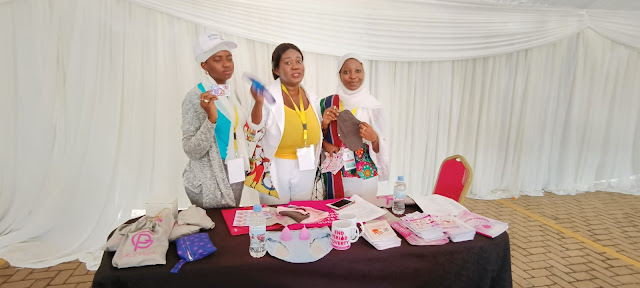Congratulations! We are celebrating the successful completion of '' Sustainable lifestyle-Campaign with Sofonie Dala -Angola'' Don't Miss Out!
Ladies and gentlemen, good evening!
The first edition of our campaign ''SUSTAINABLE LIFESTYLE - TRANSFORMING FOOD SYSTEM- ANGOLA'' came to an end. The end of the campaign is not the end of the movement, thanks to online spectators and people who believe and support our work!
Our everyday motto is: "Let food be your medicine and medicine be your food"
Hello everyone!
My name is Sofonie Dala, I'm from Angola. Today we are celebrating the successful completion of our latest campaign - Living a Sustainable Lifestyle. Meaning this campaign inspires and guides youth action for both individual and systems change that enables sustainable lifestyles.
The campaign also works to identify and mobilize Youth globally on Environmental Issues, Ideas, and Solutions to Food Systems.
On this very special day, we are going to show you how to use soy products. I have two types of soy flour, this one more brownish, is used to make tea and this yellowish one is used to make the soy porridge. In addition to milk, soy tea is very rich in protein and also very good for our health, drinking it every morning helps fight malnutrition, especially in children, as we can see in the following scenario.
Using soy flour to make delicious delicacies (tea and porridge)
Our little Flo is enjoying a delicious tea and soy porridge!
Malnutrition is one of the main causes of child death in Angola. Furthermore, children, with weaker bodies and health, are more vulnerable and suffer seriously from hunger.
Therefore, it is highly recommended to use soybean flour, tea and soybean milk as protein quality diet to improve nutritional status of malnourished children.
Report of the campaign
As the effort to achieve equality life for all continues, we launched our campaign to instruct youth to live the sustainable lifestyle towards climate action, gender equality, nourished and healthy food, quality education and social justice for all.
The campaign was focused on transforming the food system with the main objective to guide and inspire young people to live a more sustainable lifestyle starting by exploring what we can and what we are already doing to live more sustainability until the reduction of unsustainable actions that harm our health and the environment.
We recorded several case studies, worked with ordinary citizens of various ages including children and elderly people, and also had the special participation of therapist and Doctor of traditional medicine Mr. Xavier.
We found that people in Angola eat foods based on edible and medicinal plants such as cassava leaves, moringa, shaya, scoparia dulcis, cabbage, tubercles and cereals, potato branches and many other vegetables planted in their own family gardens. According to therapist Xavier, these plants help fight diseases such as: diabetics, hepatitis, typhoid fever, headaches, stomach pain, bowel problem, lack of appetite, lack of vitamins in the organism and several other illnesses.
It is interesting that one of the popular dishes of Angolans is Funje (Garri)- a traditional Angolan recipe for a classic porridge made by stirring fufu (known as cassava flour) into water. It is a staple accompaniment in Angola to many dishes, including the calulu stew dishes and various others. It is a smooth and creamy mashed potato like substance that is perfect for evening out the intense flavor and wonderful spicy kicks of many Angolan dishes.
Garri also refers to the creamy granular flour obtained by processing the starchy tuberous roots of freshly harvested cassava. made in Africa, this meal is a very high energy food, contains proteins, fat, carbohydrates, iron, Vitamin B and C and also starch.

We also explored the importance of soy products role in the treatment of malnutrition, especially in children.
The results of the campaign also show us that many people do not eat well, consume foods and beverages that not only harm their health but also harm the environment, they also lack knowledge about what it means to live a sustainable and they don't even imagine that many of their actions are unsustainable and cause damage to the environment, for example, throwing away the leftover. Food waste from homes is a greater cause of global warming, it generates 8 a 10% of greenhouse gas emissions. When food is thrown out, it eventually makes its way to landfills (which can themselves be a problem for the environment). Food that ends up in landfills produces a large amount of methane – a more powerful greenhouse gas than even CO2.
Based on these and other factors, we conclude that there is an urgent need to educate and use all means of communication to inform communities about the importance of living a sustainable lifestyle in order to ensure long life for everyone and our for planet.
Today, we are presenting the conclusion. If you would like to learn more, please click on these links to watch the non-fiction stories of these interesting citizens and explore anything that catches your attention:Webisode 2 - Interview with Patricia - unsustainable eating
Webisode 5 - soybean flour and soybean milk as protein quality diet to improve nutritional status of malnourished children
Webisode 6 - Don't throw away the leftovers
Webisode 8 - Children stopping unsustainable actions that affect the quality of life and opportunities of people in communities
Webisode 9 - Understanding the secret of a long life
Webisode 10 - Funje is a a traditional Angolan recipe for a classic porridge made by stirring fufu (known as cassava flour)
Campaign introduction - Remembering the International Youth Day - Transforming food systems
Our show came to an end. The end of the campaign is not the end of the movement.Thanks largely to many of you here! We are not saying good bye, we will come back soon with new webisodes.

This campaign inspires and guides youth action for both individual and systems change that enables sustainable lifestyles.




Comments
Post a Comment